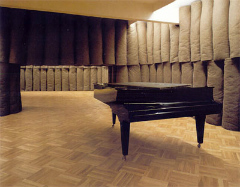“I repeat all the great experiments of the 19th Century. My results are much better, more consistent, and more subtly nuanced.”
 What will I think of the scientist who makes such a pronouncement? I might think that person’s not a scientist. A craftsman perhaps. An artisan or hobbyist? But this guy’s goal in the laboratory would seem to be something other than discovery, something other than science.
What will I think of the scientist who makes such a pronouncement? I might think that person’s not a scientist. A craftsman perhaps. An artisan or hobbyist? But this guy’s goal in the laboratory would seem to be something other than discovery, something other than science.
And doesn’t this apply to art as well?
Yes, there’s Pierre Menard, in Borges story, writing (anew) passages of Don Quixote, word-for-word:
“To compose the Quixote at the beginning of the seventeenth century was a reasonable undertaking, necessary and perhaps even unavoidable; at the beginning of the twentieth, it is almost impossible. It is not in vain that three hundred years have gone by, filled with exceedingly complex events…”
So to play music by Beethoven today may be to recontextualize it. It’s not to say that there can’t be art in that — in that rereading. But it’s quite specialized. To approach an array of music, including music written now, the useful occupation of making, playing, and hearing music that has not been heard before — that’s the work of the professional musician, the “expert” practitioner.
Some in classical music, consider musicians who play new music to be specialists. In pop, musicians who only repeat the past (cover bands) are usually peripheral.
Someone who does not work with an aspect of present research or practice can’t be considered “professional.” For me, it is not those classical musicians who play new music that are the specialists — it is those who access only music by Beethoven and Brahms.

I completely agree with that.
Works are not “fixed” but always in motion, evolving through ages. Interpreting them in a different way than the traditional one doesn’t necessarily mean betraying the essence of the pieces or the composer. What’s the point anyway of saying again and again what has already been said before?
New music gave me a perspective, allowed me to better understand where the limits between creation and interpretation stand. What I can do as a performer, and what I can’t. Thanks to new music, I simply have become a musician. Without new music, I would have probably remained a good technician and never have my own perspective on music and the work I play.
Where does one even begin to unravel the bogus logic and hokum thinking in this screed of self-exculpation?
Hokum? REALLY, Neil?? Any time you’re playing someone else’s composition, you are filtering through your own musical experience. That is the beauty of music as an art form. Unlike the visual arts, where you actually finish a work and it is fixed, music just evolves (or devolves, as you might care to look at it). The logic makes perfect sense to me as a musician.
Sure, like I never noticed that in my 30-year career, “Julie”.
Go and patronise someone else – oh, ‘as a musician’, of course, you pouting cow.
Alright, Brubaker, I’ll respond to your shit – since it was clearly written to be provocative TROLLING in the first place.
You trolled:
>> So to play music by Beethoven today may be to recontextualize it. It’s not to say that there can’t be art in that — in that rereading. But it’s quite specialized. <> Someone who does not work with an aspect of present research or practice can’t be considered “professional.” <<
EMPTY FUCKTARD TROLLING.
Now go and JERK OFF your stuff in front of the audience of 7 people who come to it – all of whom are your invited friends.
THERE IS NO AUDIENCE FOR THE SHIT YOU PLAY. TELLING PEOPLE THAT THEY'RE UNPROFESSIONAL FOR FAILING TO COME TO YOUR CRAPPY WORTHLESS CONCERTS IS JUST THE LAST STAGE OF SELF-DELUSION, SHITHEAD.
There, are you happy now?? Someone gave you the response you wanted when you trolled.
It's unbelievable that an asshole like you is employed by a teaching institution, I pity your students, I really do, You shouldn't be permitted to teach.
you know, i was on the fence about what you were saying until you used all caps. then i totally saw you were right. nothing like screaming incoherently in front of someone to prove a point!
but really, get some medication, or up your own troll game (hint: subtlety is a little bit better)
Someone asked me the other day if I planned to approach John MIlton from a “presentist” perspective rather than a “historicist” one.
With that said, I wonder if it’s truly possible to ever filter out one’s own ways of thinking and looking at things, things that are quite frankly rooted in our own culture and personal experience and education. Is it possible to get rid of that even in approaching Beethoven, or Milton, which are years before? Or in other words, is it possible to work WITHOUT some present research or practice (even if not deliberately done)? Is it even desirable to get rid of that?
Is the point where we attempt to deal with fixed meanings at fixed points at time via (what we think) is the fixed perception of one person the point where we stop making music?
Wow, who would have thought that such an anodyne sentiment would arouse such passion! Frankly, I am not talented enough to bring anything new to Beethoven or Chopin, so I generally study second tier composers or pieces not generally performed, so I can share something new with my friends.